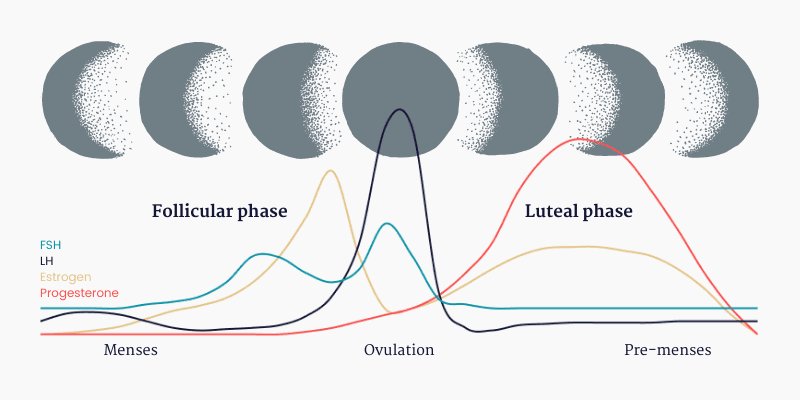
In a world where Roe v. Wade is overturned, where female reproductive rights are still a topic of argument, and where bodily autonomy of virtually anyone who isn’t a cis-gendered man are under attack, we urge you not to panic! If we want to fight these trends, we have to be truly empowered. Knowledge is power. So, let’s look at the menstrual cycle:
How well do you know your menstrual cycle? Do you remember what you learned in health or biology class? Maybe you remember the basics, but do you know how this relates to your every-day life? To get started, let’s cover the basics.
What is the menstrual cycle and is it different from menstruation?
Your menstrual cycle - or cycle for short - is not just your period (or menstruation). It is actually the entire time between two periods. Let’s say you start your period today and your last period started on the 21st of September. This would make your cycle 29 days long. So, the cycle length is the number of days between two consecutive periods. You start counting on the first day you bleed.
What is a normal
cycle length? And what is a normal
period?
Let’s be clear about one thing: there are as many different cycles and periods as there are menstruators in the world.
That magic number of 28 days cycle length is actually just a clinical guideline, the median to be exact - meaning that half of cycles are below 28 days long and half are more than 28 days long. A rather big study of over 600,000 real-world cycles actually found an average, or mean, of 29.3 days. But overall, the cycles in this study ranged anywhere from 18 to 45 days in length.
Periods behave similarly varied. They can range anywhere from 2 to 7 days, the average coming in at 4 days +/- 1.5 days.
So, if you’re worried about your cycle not being normal
, know this: there is no normal
. The key to feeling empowered and calm about your cycle is simply to understand your own normal. This is why cycle tracking is such an integral part of your self-empowerment and your sexual, mental, and physical health.
These are your hormones and cycle phases.
Your cycle is mainly driven by these hormones: the two ovarian hormones estrogen and progesterone, and the two anterior pituitary hormones LH (luteinizing hormone) and FSH (follicle-stimulating hormone). The rise and fall of these create the different cycle phases that you live through.

1
Your cycle starts on the first day of your menses, your period. Your hormones typically start out at their lowest points, your body is shedding the uterine lining, if you didn’t get pregnant.
2
As your FSH and LH rise, you’re going through the phase called the follicular phase. During this phase several follicles start growing. The most dominant one - the ovarian follicle - continues to grow until it reaches maturity.
3
When your estradiol and LH peak, your egg is released from your ovary. This peak moment is called your ovulation.
4
Falling levels of FSH and LH cause the dominant follicle to transform into the corpus luteum, which increases progesterone production. This in turn, induces estrogen production. These two hormones peak during this second big phase of your cycle (estrogen for the second time); the luteal phase is when your uterine lining thickens (in preparation of a possible pregnancy) or prepares to be shed (in your next period).
5
As all of your hormones fall back down to their lowest levels, your menstruation is triggered (if your egg wasn’t fertilized). Some people experience harsh symptoms during the days before the onset of menses, which is why these few days leading into a new period are also called PMS (pre-menstrual syndrome).
These phases and peak & valley moments of your cycle can vary in intensity, length, and expression for each and everyone who experiences a cycle. Please know that we deliberately didn’t assign days or values here, because this whole process is such a highly individual experience and will even vary in your lifetime from one cycle to the next.
Observe your cycle to learn more about whether these patterns are true for you or what your own patterns look like.
Practical tip:
On each of your cycle days, track your moods, behaviors, feelings, and health. This could be a simple mindfulness practice at the end of the day, but make sure to record it somehow. Write it down or audio record it for yourself. After a few cycles, you should already be able to see your patterns.
Do you always get the same kind of cravings during the last week before a new period?
Do you always have a single day of tiredness or sadness somewhere right in the middle of your cycle?
Do you always have this sense of having to finish all of your open-ended tasks at around the same time each cycle?
Your cycle is not something to be managed away. Rather, it should be fully integrated into your daily lifestyle. And this could look like this:
If you have those cravings, go out and prepare for them! Make those foods especially for yourself and indulge.
If you have that sudden drop in energy and mood, mark it in your calendar and (if you can) schedule some off time for yourself or take longer breaks between meetings at work.
If you have this sense of crossing off all those unfinished to dos during one week, capitalize on it. Do all the things and get sh*t done!
For far too long, your cycle has been ignored; your period has been made a nuisance, and your daily life has been forced into a linear mold. But your cyclical nature is who you are, how you function, and can tell you what you need.
Start tracking your menstrual cycle, because:
1
Recognizing your unique monthly patterns is incredibly freeing and empowering! Just imagine, you won’t have to guess or be surprised by certain symptoms ruining your day anymore.
2
Tracking and analyzing can show you a way to heal your negative menstrual cycle symptoms, such as PMS, cramping, and heavy bleeding. If even helps you to recognize when something is off earlier!
3
Tracking introduces a daily mindfulness practice to your life that is natural, healthy, and feminine.
The current political climate shouldn’t influence whether or not you track your menstrual health. We understand that you might be skeptical of using an app to track. Of course, you can always choose to track on paper (see Living With Your Cycle for a printable cycle tracker and guidebook!). However, there are undeniable advantages to tracking in an app. Here are some security issues you need to take into consideration when choosing a tracking app.
Find a safe app that actually takes data privacy seriously (i.e. that follow's the EU's data protection regulations or similar!). The Baba Yaga is a small Germany-based startup working on exactly these two things for you. Safe menstrual health tracking is nobody's business except YOURS. We believe you have the right to be empowered by your hormones, not burdened by them. We are bootstrapping this startup (with no big VC funding) because this is all about YOU - whether you have a uterus but no more periods, a regular period, or a super irregular cycle - the Baba Yaga is for you. It's the Baba Yaga's job to empower YOU, to support YOU, to help heal YOU.
There are no ads & we will never sell your data.
There are no integrations with social media apps, other tracking apps, or even with Apple's Health app - by design!
The anonymized data we do collect is stored in Europe and as safe as can be from corporations such as Facebook, Google, etc.
Sources & Credits
Bull, J.R., Rowland, S.P., Scherwitzl, E.B. et al. Real-world menstrual cycle characteristics of more than 600,000 menstrual cycles. npj Digit. Med. 2, 83 (2019). https://doi.org/10.1038/s41746-019-0152-7
Komada, Y., Sato, M., Ikeda, Y., Kami, A., Masuda, C., & Shibata, S. (2021). The Relationship between the Lunar Phase, Menstrual Cycle Onset and Subjective Sleep Quality among Women of Reproductive Age. International journal of environmental research and public health, 18(6), 3245. https://doi.org/10.3390/ijerph18063245
Photo by Andrea Piacquadio from Pexels
Disclaimer
It is extremely important to note that we are fully aware of the - still - gross lack of accurate & well-designed meta-analyses to make any kind of generalizable conclusions or statements about all cycles, all periods, and all menstruators. However, we aim to A, bring awareness to the personal importance of cycle tracking and B, point out that poor study design and this wide-spread unwillingness to even tackle this topic are not an acceptable status quo.